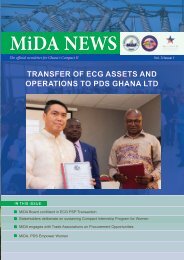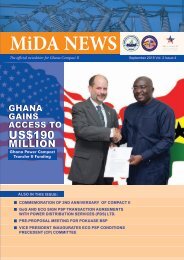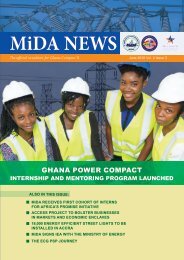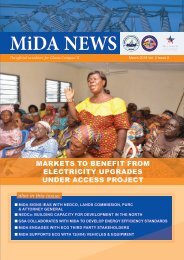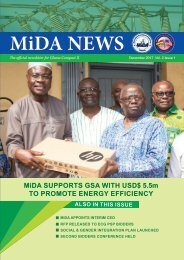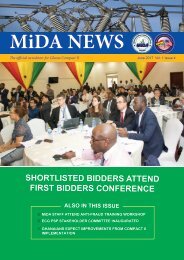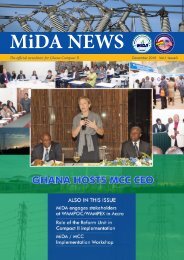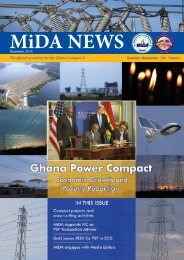MiDA_News_Volumn1_Issue2
Create successful ePaper yourself
Turn your PDF publications into a flip-book with our unique Google optimized e-Paper software.
Millennium Development Authority<br />
Quarterly <strong>News</strong>letter Vol. 1<br />
<strong>MiDA</strong> NEWS<br />
.<br />
The official newsletter for Ghana Compact II June 2016 Vol. 1 <strong>Issue2</strong>
Millennium Development Authority<br />
Quarterly <strong>News</strong>letter Vol. 1 Issue 2<br />
CONTENTS<br />
ECG PSP Roadshow held in Accra.......................................................................3<br />
ECG PSP Pre-Qualification Bid Opening.............................................................6<br />
Work Commences on Design and Implementation of a Utility GIS for ECG......7<br />
Ghana Power Compact - Data Quality Review.....................................................9<br />
Council of State (COS) Pledges Support for Compact II Projects.......................11<br />
<strong>MiDA</strong> engages with Institute of Economic Affairs (IEA)...................................12<br />
<strong>MiDA</strong> presents Compact II at the Crystal Ball Africa Event...............................13<br />
<strong>MiDA</strong> Team Building Workshop.........................................................................14<br />
SITA CORP Hands Over SAP Software to <strong>MiDA</strong>..............................................15<br />
<strong>MiDA</strong> Staff Undergo Gender Sensitization Training..........................................16<br />
<strong>MiDA</strong> Officials Receive Training on Engaging the Media.................................18<br />
2
Millennium Development Authority<br />
Quarterly <strong>News</strong>letter Vol. 1 Issue 2<br />
ECG PSP ROADSHOW<br />
HELD IN ACCRA<br />
The Millennium<br />
Development<br />
Authority, <strong>MiDA</strong>,<br />
has organised a Road<br />
Show for prospective investors<br />
seeking to manage,<br />
operate and invest in Ghana’s largest power<br />
distributor, Electricity Company of Ghana<br />
(ECG). The Roadshow, held in Accra, is an event<br />
under the Private Sector Participation in ECG activity<br />
within the ECG Financial and Operational<br />
Turnaround (EFOT) Project, which is one of six<br />
major projects under the Ghana Power Compact<br />
Programme.<br />
Over 150 participants, including ministers of<br />
state, government officials, representatives from<br />
the Ministries of Power, Finance, Justice and<br />
Attorney-General, Gender, Children and Social<br />
Protection, management officials of ECG, PURC<br />
and Energy Commission attended the event. Local<br />
and foreign organisations that have expressed<br />
interest in the Private Sector Participation (PSP)<br />
in ECG transaction, development partners and<br />
financial institutions were also present.<br />
In his welcome address, Ing. Owura Sarfo, Chief<br />
Executive Officer of <strong>MiDA</strong>, expressed his pleasure<br />
that so many of the invitees had honoured<br />
the request to attend the Roadshow. “I see today’s<br />
event as part of the process to positively<br />
transform Ghana’s Power sector” he said. Ing.<br />
Sarfo explained that the Road Show was to provide<br />
more information on the transaction and<br />
to give prospective investors an opportunity to<br />
meet other investors, form strong alliances and<br />
to also facilitate the promotion of local content<br />
requirement in the PSP<br />
transaction.<br />
Launching the Road<br />
Show, Hon. John Jinapor-<br />
Deputy Minister<br />
for Power, commended<br />
<strong>MiDA</strong> for putting the event together and reiterated<br />
government’s commitment to the PSP in ECG<br />
transaction. He said “government’s objective for<br />
the PSP in ECG is to have a technically and financially<br />
sound ECG, which is key to making Ghana’s<br />
power sector a vital engine of the country’s<br />
development.” “I urge everyone present here to<br />
take advantage of the networking opportunity<br />
provided here to deliberate on ways to collaborate<br />
and take advantage of the opportunities that<br />
the project presents particularly with regards to<br />
local content requirements.” Hon. Jinapor said.<br />
As part of processes towards selecting a concessionaire<br />
for the transaction, <strong>MiDA</strong> recently published,<br />
in the Ghanaian and foreign print media,<br />
a request to pre-qualify (RfQ) for selection of a<br />
concessionaire to operate, manage and invest in<br />
ECG. A presentation explaining the RfQ process<br />
was delivered by Julius Kpekpena, Chief Operating<br />
Officer of <strong>MiDA</strong>. He explained that the RfQ<br />
spells out the criteria to qualify companies that<br />
have expressed interest in the PSP in ECG transaction.<br />
Companies that have expressed interest<br />
in the transaction, also known as bidders, will be<br />
shortlisted following the RfQ to submit their proposals<br />
on how they intend to operate the concession<br />
under the terms and conditions highlighted<br />
in the Request for Proposals (RfP)<br />
Mr Kpekpena also said that submissions for both<br />
the RfQ and the RfP will be reviewed by an independent<br />
panel of reviewers constituted for each<br />
process. He emphasized that <strong>MiDA</strong> is waiting to<br />
receive the credentials of nominated panel members<br />
from agencies and institutions with expertise<br />
in reviewing procurement processes of this<br />
nature.<br />
Prospective investors or bidders who attended<br />
the event acknowledged that the roadshow had<br />
been worthwhile and are looking forward to the<br />
processes leading to the award of the concession<br />
to the winning bidder.<br />
3
ECG PSP ACCRA ROADSHOW<br />
EVENT IN PICTURES<br />
<strong>MiDA</strong> COO: Julius K. Kpekpena<br />
Pamela Djamson-Tettey<br />
Director, Communications and Outreach<br />
Elizabeth Feleke<br />
MCC Deputy Country Director<br />
From left: Mr. Fuseni Abu; Procurement Director, Mr. Eric Asare; Distribution<br />
Projects Director, Mr. Samuel Afram; EFOT Project Manager<br />
4
<strong>MiDA</strong> CEO: Ing. Owura K. Sarfo<br />
5
Millennium Development Authority<br />
Quarterly <strong>News</strong>letter Vol. 1 Issue 2<br />
PARTICIPANTS COMMEND <strong>MiDA</strong> FOR<br />
PSP ROADSHOW<br />
Participants who attended the PSP in ECG<br />
Roadshow held at the Alisa Hotel in Accra<br />
have expressed their pleasure at the initiative<br />
for the event. say they pleased with the<br />
event. The PSP in ECG Roadshow was organised<br />
by <strong>MiDA</strong>, in collaboration with the Government<br />
of Ghana and ECG, to provide v prospective<br />
investors with more information on the<br />
transaction and to give them an opportunity to<br />
meet other investors, form strong alliances and<br />
to also facilitate the promotion of local content<br />
requirement in the PSP transaction.<br />
More than 80, out of about 170 participants at the<br />
event, represented various companies that have expressed<br />
interest in the concession arrangement in<br />
ECG. Other participants were representatives from<br />
the Ministries of Power, Finance, Justice and Attorney-General,<br />
Gender and Social Protection, management<br />
officials of ECG, PURC and Energy Commission.<br />
Also attending were personnel from local<br />
banks and financial advisory institutions.<br />
A representative from Enel Energy, Marco, congratulated<br />
<strong>MiDA</strong> for organising the Roadshow. saying<br />
ECG PSP Pre-Qualification Bid Opening<br />
Event in Pictures<br />
9th May, 2016<br />
6
Millennium Development Authority<br />
Quarterly <strong>News</strong>letter Vol. 1 Issue 2<br />
WORK COMMENCES ON DESIGN AND<br />
IMPLEMENTATION OF A UTILITY GIS FOR ECG.<br />
<strong>MiDA</strong>, in collaboration with the Electricity<br />
Company of Ghana (ECG) has commissioned<br />
a Consultant to define the requirements<br />
and design a utility Geographic Information<br />
System (GIS) for ECG. The design and installation of<br />
the utility GIS is an activity under the Modernizing<br />
Utility Operations sub-project under the ECG Financial<br />
and Operational Turnaround (EFOT) Project.<br />
The objective for this activity is to enable ECG<br />
manage its distribution system efficiently; help<br />
the company respond promptly to emergency<br />
faults, easily identify customer locations and<br />
power thefts, properly manage its assets and inventory,<br />
and perform engineering analysis.<br />
A GIS can be defined as a “computer system<br />
used for capturing, storing, checking, and displaying<br />
data related to positions on the earth’s<br />
surface.” GIS can show many different kinds<br />
of data on one map which enables one to more<br />
easily visualize, question, analyze, and interpret<br />
data to understand relationships, patterns, and<br />
trends. There is a growing global interest in and<br />
awareness of the economic and strategic value<br />
of GIS.<br />
The installation of a utility<br />
GIS will enable ECG<br />
record and store data<br />
including its distribution<br />
system asset, attributes<br />
and characteristics;<br />
customer locations and<br />
other characteristics for<br />
planning and operations<br />
purposes. The GIS system<br />
will also record and<br />
store ECG’s asset data in<br />
the form of digitized maps and other engineering<br />
formats for use as real-time management of<br />
ECG’s asset.<br />
There are expectations that by September 2016,<br />
a utility GIS infrastructure will be ready following<br />
which implementation shall begin.<br />
Current Challenges<br />
Presently, ECG’s electric distribution network<br />
and its business processes are not geographically<br />
referenced, i.e. its assets are not recorded and<br />
7
Millennium Development Authority<br />
Quarterly <strong>News</strong>letter Vol. 1 Issue 2<br />
stored electronically and defined by their longitudinal<br />
and latitudinal coordinates. As a result,<br />
ECG is unable to fully benefit from the use<br />
of modern electric utility business tools. ECG<br />
does not have accurate maps for large portions<br />
of its electric distribution networks largely because<br />
of the absence of a central network data<br />
repository. Business processes are essentially<br />
manual, or are housed in stand-alone computerized<br />
systems and therefore system data maintenance<br />
has become a real challenge in ECG.<br />
How will ECG Benefit from a Utility GIS?<br />
• A utility GIS will help ECG to manage and<br />
map the location of thousands of kilometers of<br />
overhead and underground circuits.<br />
• With GIS, ECG’s utility assets such as poles,<br />
transformers, substations, etc, can be linked<br />
directly to the customer information system,<br />
and this will allow the company to proactively<br />
monitor faults, work orders, vegetation management,<br />
as well as planned and unplanned<br />
outages.<br />
• ECG can use a utility GIS to determine the<br />
right route for electric lines, determine suitable<br />
sites for locating new feeders, as well as new<br />
technology such as smart grid sensors and<br />
smart meters.<br />
• GIS can help ECG produce accurate designs,<br />
and determine the right location for a substation<br />
and its capacity, as well as load distribution<br />
and load forecasting.<br />
• GIS will enable ECG to identify problems<br />
that cause outages, and improve customer satisfaction.<br />
• GIS will enhance ECG’s ability to identify<br />
fault locations and ultimately reduce the lead<br />
time in service restoration after the occurrence<br />
of faults. This is evident in the relative ease<br />
with which the GIS system can be used in conjunction<br />
with other operational installations to<br />
identify and isolate a fault to ensure that only<br />
the faulted area of the network is isolated whilst<br />
the healthy portions remain in service.<br />
• The use of GIS will increase the rate of new<br />
customer connections as it will reduce the lead<br />
time required in planning and executing new<br />
service connections.<br />
• GIS will help ECG to improve upon its load<br />
management program by providing engineers<br />
and planners with accurate and timely information<br />
on the network performance. This will<br />
be particularly useful during peak demand periods<br />
when several portions of the network are<br />
overloaded whereas the loading on other areas<br />
are relatively light. It is envisaged that these<br />
overloading and unbalanced loading conditions<br />
can be mitigated with the use of a utility<br />
GIS.<br />
• Installation of GIS will help ECG in reducing<br />
commercial losses by addressing issues such as<br />
illegal connections, non-payment of electricity<br />
bills, etc.<br />
• ECG can perform accurate projections for future<br />
energy needs with the help of GIS.<br />
• Customer satisfaction shall improve since<br />
outage response time declines with the help of<br />
GIS.<br />
• Commercial losses shall decline since it becomes<br />
easy to identify power theft<br />
• The turnaround time in completing network<br />
update after construction shall reduce.<br />
• Due to optimize vegetation maintenance,<br />
there shall be improvement in network reliability.<br />
• GIS shall enhance ECG’s operations with the<br />
provision of outage information to a wider set<br />
of decision makers/users.<br />
• Improved communications with consumers<br />
and other external parties.<br />
How will Customers Benefit from a Utility<br />
GIS?<br />
• Customer satisfaction shall increase since it<br />
becomes easy for ECG to identify and fix faults<br />
in a timely manner<br />
• The billing system shall improve and customers<br />
shall be provided with accurate bills.<br />
• Business entities shall see growth since power<br />
supply becomes reliable with GIS.<br />
• The duration to connect new customers shall<br />
reduce with the help of Utility GIS.<br />
• Loyalty shall be establish between ECG and<br />
its customers by the smart data system Utility<br />
GIS provides.<br />
• Since most modern businesses and homes<br />
depend on electricity, the improvement in ECG<br />
services will greatly enhance businesses and<br />
improve the income and living standards of its<br />
customers.<br />
8
Millennium Development Authority<br />
Quarterly <strong>News</strong>letter Vol. 1 Issue 2<br />
Monitoring and Evaluation & Economics (M&EE)<br />
Ghana Power Compact Data Quality Review<br />
As the second Millennium Challenge Compact<br />
Program for Ghana, dubbed ‘Ghana<br />
Power Compact’, is about to be implemented,<br />
Monitoring and Evaluation (M&E) has a crucial<br />
role to play to ensure that agreed program objectives<br />
are not only SMART (Specific, Measurable,<br />
Achievable, Realistic and Time-Framed) but also<br />
yield the desired impacts. <strong>MiDA</strong> has developed an<br />
M&E Plan to guide the implementation process. It<br />
is important to ensure that the quality of data and<br />
indicators that will be used as a part of the M&E<br />
Plan is accurate. To achieve this, <strong>MiDA</strong> has commissioned<br />
a Data Quality Review (DQR) process led by<br />
CRISIL Infrastructure Advisory Ltd (CRISIL), an<br />
independent quality assurance consultant that has<br />
significant experience in spearheading such processes.<br />
The DQR will inform the Ghana M&E Plan.<br />
DQR is a mechanism used to review and analyze<br />
the utility, objectivity and integrity of data that<br />
provide information for project performance measurement.<br />
In other words, the process is used to<br />
ensure that data for monitoring and evaluation of<br />
project activities are useful, objective and credible.<br />
The mechanism hence ensures<br />
that the underlying<br />
data that provide information<br />
on progress of project<br />
activities and support decision-making<br />
by managers<br />
are of good quality and of<br />
the required standards.<br />
The DQR Consultant is to<br />
review all Compact indicators,<br />
data and data collection<br />
methodologies with<br />
a view to providing recommendations<br />
on how to improve the quality of<br />
data used as part of the M&E Plan to <strong>MiDA</strong> and its<br />
Implementing Entities (IEs). In addition, the DQR<br />
Consultant is to produce three main reports, viz:<br />
i. a DQR Report outlining key findings observed<br />
in the field and make recommendations,<br />
ii. a Skills Requirements and Capacity Building<br />
Report which will outline specific interventions<br />
for <strong>MiDA</strong> and the Implementing Agencies cov<br />
9
Millennium Development Authority<br />
Quarterly <strong>News</strong>letter Vol. 1 Issue 2<br />
ering skill required, training areas to be imparted,<br />
equipment to be procured and a strategy for continuous<br />
improvement on data, and<br />
iii. a DQR Manual which will serve as a guide for<br />
future data quality reviews.<br />
The DQR process was initiated with the signing of<br />
the DQR Contract with CRISIL on November 2015<br />
and the final deliverable is expected by June 2016.<br />
So far, The DQR process has involved several and<br />
thorough engagements between the consultant on<br />
one side and <strong>MiDA</strong> M&E and the key departments<br />
within the institutions (ECG, NEDCo, Ministry of<br />
Power, GRIDCo, and Energy Commission) providing<br />
data on the Compact on the other side.<br />
The consultant over the period has assessed the<br />
processes of data generation, transmission, storage,<br />
retrieval and dissemination by the various IEs.<br />
Following this, a validation workshop was held,<br />
during which the IEs generally accepted the consultant’s<br />
report and made some recommendations.<br />
The DQR process is on schedule. A major deliverable<br />
– DQR Final has been submitted to <strong>MiDA</strong> for<br />
their formal reviews and approvals. The Skills Requirements<br />
and Capacity Building Report and Data<br />
Quality Review Manual are outstanding deliverables<br />
to be submitted over the remaining contract<br />
period.<br />
According to the M&E and Economics Director, Dr.<br />
Kofi Marfo, the process so far has been successful.<br />
“I am impressed and appreciative of the support<br />
and cooperation provided by the IEs” He said. Dr.<br />
Marfo added that the <strong>MiDA</strong> M&E Team and other<br />
stakeholders are currently reviewing the DQR Final<br />
Report to ensure that all Compact indicators have<br />
met the quality standards defined in the MCC’s<br />
Policy Guidelines for Monitoring and Evaluation<br />
of Compacts and Threshold Programs. The review<br />
would also ensure that every data underlying performance<br />
information meets the quality standards<br />
of validity, reliability, timeliness, precision and integrity.<br />
With the DQR on course, the Ghana Power Compact<br />
is on track to produce reliable data on the performance<br />
of projects. <strong>MiDA</strong> and MCC will thoroughly<br />
review recommendations from the reports,<br />
which will serve as guides to improve the quality<br />
of data gathering and reporting, leading to quality<br />
and accurate interpretation of results from the<br />
Compact.<br />
10
Millennium Development Authority<br />
Quarterly <strong>News</strong>letter Vol. 1 Issue 2<br />
COUNCIL OF STATE PLEDGES SUPPORT<br />
FOR COMPACT II PROJECTS<br />
Members of the Council of State have<br />
pledged their support for the Ghana<br />
Power Compact (Compact II) and also<br />
declared their intention to be advocates for the<br />
Compact projects. The assurances were made<br />
at a stakeholder meeting the Council of State<br />
held on 27th January, 2016 with a delegation of<br />
<strong>MiDA</strong> officials at the Christiansborg Castle in<br />
Osu, Accra.<br />
The meeting, which is part of its ongoing stakeholder<br />
outreach was requested by <strong>MiDA</strong>. It<br />
sought to introduce and share information about<br />
the Power Compact and its various projects, explain<br />
the Private Sector Participation (PSP) activity<br />
in ECG, and discuss the role of the Council<br />
of State in the implementation of the Compact II<br />
Projects.<br />
Ing. Owura Sarfo, CEO of <strong>MiDA</strong> led a nine member<br />
<strong>MiDA</strong> delegation comprising Julius Kpekpena,<br />
Chief Operating Officer; Yvonne Fiadjoe,<br />
General Counsel; Pamela Djamson-Tettey, Director<br />
Communication and Outreach; Dr. Cherub<br />
Antwi-Nsiah, Director Gender and Social<br />
Inclusion; Mr. Mike Awuah, Reform Manager;<br />
Frank Boadi, Communication and Outreach<br />
Officer; Frank Botchway, Communication and<br />
Web Officer and Tanko Mohammed, IT Manager.<br />
Ing. Sarfo explained to the members that <strong>MiDA</strong><br />
recognises the key role the Council of State<br />
plays in providing advice to the president. He<br />
also said that the composition of the Council’s<br />
membership does not only equip it with the expertise<br />
and experience to provide counsel on<br />
several key areas of the state, but that enables<br />
it to also gauge the feelings of different regions<br />
on national issues. Hence it was imperative that<br />
<strong>MiDA</strong> engaged with members on the Power<br />
Compact, which seeks to provide solutions to<br />
the root causes of the power crisis the country<br />
has had to grapple with over the past three<br />
years.<br />
Madam Cecelia Johnson, chairperson of the<br />
Council, acknowledged that the meeting had<br />
been well conceived and that it was important<br />
for <strong>MiDA</strong> to also clarify at first-hand to the<br />
members the various misconceptions that had<br />
been raised by several media about the about<br />
the Power Compact.<br />
Other Members also recounted the benefits their<br />
regions had received from the implementation<br />
of Compact I. The members praised <strong>MiDA</strong> for<br />
the good work done under Compact I and asked<br />
that <strong>MiDA</strong> ensures that Ghanaians benefit fully<br />
from Compact II. They also requested more information<br />
and continuous engagement on Compact<br />
II in order to serve as advocates.<br />
11
Millennium Development Authority<br />
Quarterly <strong>News</strong>letter Vol. 1 Issue 2<br />
<strong>MiDA</strong> engages with Institute of<br />
Economic Affairs (IEA)<br />
<strong>MiDA</strong> engaged with the Institute of Economic<br />
Affairs (IEA), Ghana’s premier<br />
public policy institute on the Ghana<br />
Power Compact on 19th February, 2016 as part<br />
of planned outreach activities with identified<br />
stakeholders of the Compact II projects, especially<br />
the PSP in ECG.<br />
<strong>MiDA</strong> was represented at the meeting by its<br />
CEO, Ing Owura Sarfo; Communication and<br />
Outreach Director, Pamela Djamson-Tettey;<br />
Communication and Outreach Officer, Frank<br />
Boadi; and Communication and Web Officer,<br />
Frank Botchway. The founder and Board Chair<br />
of IEA, Dr Charles Mensa, with other IEA staff<br />
met with the <strong>MiDA</strong> team.<br />
As is characteristic of previous engagements,<br />
the CEO delivered a PowerPoint presentation<br />
touching on key themes including an introduction<br />
of <strong>MiDA</strong>, its mandate under Compact<br />
II as well as its functions. He also introduced<br />
the various projects under the Power Compact<br />
and discussed the rationale for the PSP activity<br />
in ECG. Ing. Sarfo clarified the misconceptions<br />
concerning the Power Compact and the recent<br />
tariff related conversation which had been associated<br />
with the Compact activities in public<br />
discourses.<br />
After the interactive presentation, Dr. Mensa<br />
affirmed the IEA's support for the Compact<br />
Projects and pledged to be advocates of the PSP<br />
activity in ECG. The IEA also communicated its<br />
preparedness to speak publicly on the transaction<br />
should the need arise.<br />
Other stakeholders engaged by <strong>MiDA</strong> in this<br />
Quarter include the Public Utilities Workers<br />
Union (PUWU), the Ghana Employers Association<br />
(GEA) and other individuals who have<br />
shown interest in Compact II and the PSP in<br />
ECG specifically.<br />
12
Millennium Development Authority<br />
Quarterly Quarterly <strong>News</strong>letter <strong>News</strong>letter Vol. 1 Vol. Issue 1<br />
2<br />
Ghana Power Compact will Create<br />
Conducive Environment To Attract More IPPs<br />
The CEO of Millennium Development Authority<br />
(<strong>MiDA</strong>), Ing. Owura K. Sarfo has<br />
said that the Ghana Power Compact will<br />
create an enabling environment that will attract<br />
more Independent Power Producers (IPPs)<br />
to the country to support power generation in<br />
Ghana. Ing. Sarfo said this at the 3rd edition of<br />
Crystal Ball Africa, organized by AB & David<br />
Africa and held at the Movenpick Ambassador<br />
Hotel in Accra on 14th January 2016. The event<br />
was themed “Rising with Africa”.<br />
Participants were corporate executives, financial<br />
services advisors, business and transaction<br />
advisors, lawyers, government officials, regulators,<br />
bankers, financial analysts, entrepreneurs<br />
and investors.<br />
In his opening remarks, Ing. Sarfo endorsed the<br />
appropriateness of the theme for the event, saying<br />
that it was time for Africa to rise. He emphasised<br />
the strong relation between the availability<br />
of Power and the ability of Africa rising to meet<br />
its potential.<br />
Also present at the event was Ms. Yvonne Fiadjoe,General<br />
Counsel of <strong>MiDA</strong>, who together<br />
with the CEO gave a presentation on “The power<br />
to rise: How the Millennium Challenge Compact<br />
can make the African power sector work–<br />
The case of Ghana.”<br />
The presentation introduced participants to the<br />
nature of Ghana’s power sector, identified its<br />
attendant challenges, and highlighted the various<br />
project interventions in the Ghana Power<br />
Compact designed to address the challenges.<br />
Participants were also told about procurement<br />
opportunities, as well as the legal instruments<br />
governing the constitution of <strong>MiDA</strong> and the various<br />
legal agreements binding the Ghana Power<br />
Compact.<br />
Crystal Ball Africa sought to provide insights<br />
into what businesses and executives could expect<br />
in the year 2016, examined the real threats<br />
and analysed emerging opportunities to help<br />
participants strategize appropriately for the<br />
year.<br />
13 13
Millennium Development Authority<br />
Quarterly Quarterly <strong>News</strong>letter <strong>News</strong>letter Vol. 1 Issue Vol. 21<br />
<strong>MiDA</strong> Teambuilding Workshop<br />
Solid teamwork is the basis for success in most<br />
modern organizations by leveraging the<br />
synergies that are produced as people collaborate.<br />
It is even more imperative in <strong>MiDA</strong>’s case to<br />
engender the spirit of teamwork amongst staff<br />
given that the current workforce<br />
consists of people with<br />
different backgrounds and orientations who are<br />
expected to gel within the shortest possible time to<br />
facilitate efficient and effective Compact II<br />
implementation.<br />
In the light of the above the Human Resource<br />
Department of <strong>MiDA</strong> organized a one-day<br />
teambuilding training workshop for staff on 21st<br />
January, 2016 at the Alisa Hotel. The rationale<br />
of the training was to (1) help staff understand<br />
the importance of teamwork (2) help deal with<br />
conflict that may crop up and (3) engender team<br />
spirit amongst staff.<br />
Management and staff used the opportunity to<br />
finalize discussions on the Vision, Mission and<br />
Values of <strong>MiDA</strong> to guide staff in the implementation<br />
of the Ghana Power Compact.<br />
A cross section of <strong>MiDA</strong> Staff at the team building workshop<br />
14 14
Millennium Development Authority<br />
Quarterly <strong>News</strong>letter Vol. 1 Issue 2<br />
SITA CORP HANDS OVER SAP<br />
SOFTWARE TO <strong>MiDA</strong><br />
Sita Corp, a global<br />
player in the development<br />
of IT Software<br />
solutions, officially handed<br />
over an SAP software<br />
it has been developing for<br />
the Ghana Power Compact<br />
Programme to <strong>MiDA</strong>. A<br />
short handing over ceremony<br />
was organised by<br />
Sita Corp at <strong>MiDA</strong>'s Board<br />
Room to commemorate the<br />
handover. The ceremony<br />
demonstrated that Sita Corp had fulfilled its obligations<br />
with the development of the programme<br />
and had handed over a clean and working system<br />
to <strong>MiDA</strong>. Mr John Boakye, Chief Finance Officer<br />
(CFO) at <strong>MiDA</strong> received the program from Srinivas<br />
Jinka, Project Manager at Sita Corp.<br />
Sita Corp has over 20 years of experience offering<br />
SAP implementation and services to organisations<br />
in various industries such as consumer goods, manufacturing,<br />
financial services, retail and public sector.<br />
Following the ceremony, <strong>MiDA</strong> <strong>News</strong> (MN) had a<br />
chat with Srinivas Jinka (SJ), to find out more about<br />
the SAP programme and its usefulness to the Compact.<br />
MN: Hello and welcome. Can you explain what the<br />
SAP PROGRAMME is?<br />
SJ: SAP is a Management Information System (MIS)<br />
software. What we developed is the SWIFT Solution<br />
(SOFTWARE IMPLEMENTATION FAST TRACK)<br />
which is used by all major fortune 400 companies<br />
in the world. The programme is tailored for Compacts<br />
and has been used in the Malawi, Zambia and<br />
Indonesia Compacts. Ghana is the fourth Compact<br />
nation to implement the programme.<br />
MN: What is the benefit of using the SAP?<br />
SJ: A very good benefit of having the SWIFT Solution<br />
is budgetary control, i.e. keeping track of how<br />
you are spending money. It helps ensure that projects<br />
stay within budgets and within project time.<br />
The programme will thus help <strong>MiDA</strong> manage its<br />
spending on the various projects; ascertain what<br />
they are spending on, and how they are spending.<br />
The programme will also help <strong>MiDA</strong> to produce<br />
reports to send to MCC. SAP will capture the activities<br />
in the projects, allow the project managers<br />
to plan costs, give projections on how much project<br />
activities cost, and take approvals.<br />
It can also assist<br />
manage project sub activity<br />
tracking. SAP will help<br />
track project milestones,<br />
expenditure and reporting.<br />
MN: Are there other benefits<br />
aside managing project<br />
spending?<br />
SJ: The solution would<br />
support transparent procurement<br />
processes. A<br />
project manager can use the system to identify procurements<br />
already started, those initiated but not<br />
started and the stages these projects are.<br />
MN: Who will use the sap?<br />
SJ: The programme will be primarily used by the<br />
Fiscal Agent and Procurement Agent of <strong>MiDA</strong>. The<br />
other users will be project directors, and the Finance<br />
and management personnel.<br />
MN: How would SAP affect or improve <strong>MiDA</strong>’s relationship<br />
project contractors?<br />
SJ: A major benefit would be payments due contractors.<br />
The tracking component of the programme<br />
helps to track payments due contractors.<br />
Once contractors honour their deliverables SAP<br />
will notify <strong>MiDA</strong> of due payments to contractors<br />
based on their payment schedule. If everything is<br />
good, contractors should not have any problems<br />
and payments would happen in a timely fashion.<br />
MN: How long has it taken to train users of the program?<br />
SJ: There was two weeks of training for the <strong>MiDA</strong><br />
personnel. This was completed in December 2015.<br />
We have had a week, after the training, to test the<br />
systems functionality. During the period, we dedicated<br />
sometime to capture historical data. There is<br />
always a learning curve. I would say it takes about<br />
2-3 months to use the solution.<br />
MN: What will be your final words?<br />
SJ: The way other compacts have benefitted. It will<br />
make life easy for you. Do not keep anything pending.<br />
It takes time to learn but once you start capturing<br />
all the information and completed it will be<br />
just a click of a button. Using SAP efficiently will<br />
capture all the information needed for the users.<br />
1515
Millennium Development Authority<br />
Quarterly <strong>News</strong>letter Vol. 1 Issue 2<br />
<strong>MiDA</strong> STAFF UNDERGO GENDER<br />
SENSITIZATION TRAINING<br />
The Gender and Social Inclusion Unit of<br />
<strong>MiDA</strong> has organised a gender sensitization<br />
workshop for <strong>MiDA</strong> Staff. The two<br />
half day training sessions sought to enhance staff<br />
understanding of gender, erase biases and erroneous<br />
perceptions they may hold about gender<br />
and its related concepts. The training was also<br />
intended to highlight the importance of gender<br />
to <strong>MiDA</strong> and the success of the Compact. Fifty-five<br />
staff, comprising 18 females and 37 males<br />
participated in the workshop,which was organised<br />
in three group sessions for all levels of staff.<br />
The Compact, signed between the Republic of<br />
Ghana and the United States of America, places<br />
Gender and Social Inclusion as a key requirement,<br />
ensuring that the program delivers positive<br />
social impacts through the six Compact<br />
Projects. Dr Cherub Antwi-Nsiah, Director<br />
Gender and Social Inclusion at <strong>MiDA</strong> and lead<br />
facilitator of the training, explained that “as an<br />
institution seeking to promote economic growth<br />
through the implementation of the Compact, it<br />
is important that staff are sensitized about gender,<br />
learn to embrace its concepts and become<br />
aware of the gendered issues in Ghana’s energy<br />
sector.”<br />
The training adopted an experiential approach<br />
and applied participatory methods to create the<br />
awareness that gender was socially constructed.<br />
“We wanted staff to understand that gender is<br />
socially constructed<br />
and therefore designed<br />
the training activities<br />
in a manner that would<br />
cause participants to<br />
reflect on their experiences<br />
of gender and<br />
to understand gender<br />
terms” Dr Antwi-Nsiah<br />
said.<br />
Some activities participants<br />
engaged in<br />
included the childhood<br />
memory exercise<br />
which caused participants to reflect on the first<br />
time they realized that there were differences<br />
between males and females. Participants also<br />
conducted a problem tree analysis in which they<br />
identified gendered problems and the institutions<br />
that perpetuated them.<br />
Participants indicated that the training was very<br />
useful and has enhanced their understanding of<br />
gender. For some, the training dispelled notions<br />
that gender was only about women. According<br />
to Faustina Acheampong, the Front Desk Officer,<br />
the training was “an eye opener for me<br />
and has helped me to understand what gender<br />
means broadly and its related issues. I know<br />
that for some people, gender is all about women,<br />
but this training has helped clarify that gender<br />
is about both men and women.” Benjamin<br />
Botwe, a driver, also believes that the “training<br />
16
Millennium Development Authority<br />
Quarterly <strong>News</strong>letter Vol. 1 Issue 2<br />
would help enhance our relationships with our<br />
wives and other women in our homes.”<br />
Dr Antwi-Nsiah added that the training has<br />
supported in garnering more acceptance for<br />
mainstreaming gender in designing the project<br />
activities. “After the training, I have had project<br />
managers come to me to discuss gender issues<br />
within their projects and how these can be<br />
addressed. Having this understanding will the<br />
help project managers appreciate better the recommendations<br />
that would be made in the Social<br />
and Gender Integration Plan (SGIP)”she said.<br />
The SGIP will identify approaches for regular,<br />
meaningful and inclusive consultations with<br />
women and other vulnerable or under-represented<br />
groups, consolidate findings and recommendations<br />
of Project-specific social and gender<br />
analyses and set forth strategies for incorporating<br />
the findings of into final Project designs.<br />
17
Millennium Development Authority<br />
Quarterly <strong>News</strong>letter Vol. 1 Issue 2<br />
<strong>MiDA</strong> OFFICIALS RECEIVE TRAINING<br />
ON ENGAGING THE MEDIA<br />
Fifteen officials of <strong>MiDA</strong> have undergone<br />
a two day media training to enhance their<br />
media engagement skills. The training was<br />
organised to equip participants with the skills<br />
to communicate the goal and objectives of Compact<br />
II effectively through the media to the public.<br />
The workshop, which was initiated by <strong>MiDA</strong>’s<br />
Communication and Outreach Unit and facilitated<br />
by Skill Hive Africa (a subsidiary of Stratcomm<br />
Africa Group), trained the participants<br />
on how to communicate key messages and<br />
manage a media interview. They were also taken<br />
through exercises which prepared them on<br />
how to stay on the message, understand how to<br />
get the most out of a media engagement, and<br />
how to feel more confident in using the media.<br />
Participants included Eric Asare, Director Distribution<br />
Projects, Benjamin Opoku, Director<br />
for Environment and Social Performance, and<br />
Dr Cherub Antwi-Nsiah, Director Gender and<br />
Social Inclusion.<br />
Other participants<br />
were project managers,<br />
officers of the<br />
communication and<br />
outreach unit, and<br />
the Reform Unit Associate.<br />
Ing. Owura Sarfo,<br />
CEO of <strong>MiDA</strong>, Julius<br />
Kpekpena,<br />
COO, Yvonne Fiadjoe<br />
General Counsel,<br />
Mawunyo Rubson,<br />
Director Generation Projects, Pamela Djamson-Tettey,<br />
Michael Awuah, Reform Unit Manager<br />
(all of whom had participated in an earlier<br />
training), and Dr Kofi Marfo joined the other<br />
participants on the second day of the training.<br />
Effectively communicating the benefits of<br />
the Compact to Ghanaians, as well as other<br />
stakeholders, has been identified as key to<br />
18 18
Millennium Development Authority<br />
Quarterly <strong>News</strong>letter Vol. 1 Issue 2<br />
<strong>MiDA</strong> achieving stakeholder buy-in and being<br />
successful with the project. Compact II, which is<br />
also known as the Ghana Power Compact, seeks<br />
to address the constraints to the supply of adequate<br />
and reliable power in Ghana, and also address<br />
the attendant socio-economic and gender<br />
issues related to electric power.<br />
Participants found the<br />
training useful with some<br />
saying that it was helpful<br />
and gave them a new perspective<br />
of how communication<br />
can support their<br />
functions. For Sylvester Ayayee, Project Manager<br />
for Energy Efficiency and Demand Side Management,<br />
“the training was very enlightening. It<br />
really opened my eyes to aspects of communication<br />
I had no idea about. I felt confident after<br />
day one, especially after the interview with the<br />
professional journalist; being put on the spot,<br />
learning about what to say and what not to say,<br />
and making sure that your sell your key message<br />
and that is why we are here. It was also very<br />
informative. I have become more confident.”<br />
Dr Cherub Antwi-Nsiah, Director Gender and<br />
Social Inclusion, said she liked the training because<br />
participants “had hands on practice built<br />
into it, which always helps internalise points<br />
made.” She added that the training made “me<br />
recognise that I need to break down my stakeholders<br />
some more, fine tune the messages to<br />
them because each might have different needs.”<br />
Benjamin Opoku, Director Environment and<br />
Social Performance said “it is a training I will always<br />
want to be part of any time it is organised.<br />
The methodology, delivery, and examples were<br />
good.”<br />
A takeaway for participants<br />
from the training<br />
is the realisation that<br />
conveying a message to<br />
stakeholders is about simplicity, not jargons.<br />
That communicating with stakeholders calls for<br />
it to be done not from the sender’s perspective,<br />
but from a viewpoint that considers the interests<br />
of stakeholders. These they believe will inform<br />
how to couch messages and have stakeholder<br />
buy-in.<br />
There are plans to hold more training sessions<br />
over the course of the Compact to ensure that<br />
project managers and executives are well<br />
equipped to communicate appropriately so that<br />
Ghanaians and other stakeholders realise the<br />
benefits of the Ghana Power Compact.<br />
1919
Millennium Development Authority<br />
Quarterly <strong>News</strong>letter Vol. 1 Issue 2<br />
Sita Millennium Corp, a global Development player in Authority the development of IT Software solutions, on January 18 2016, officially<br />
4th handed Floor, over Heritage an SAP Tower, software it has been developing for the Ghana Power Compact Programme to<br />
Liberation <strong>MiDA</strong>. A short Road, handing Ambassadorial over ceremony Plaza was organised by Sita Corp at <strong>MiDA</strong> Board Room, to commemorate<br />
the handover. The ceremony demonstrated that Sita Corp had fulfilled its obligations with the<br />
development<br />
Ridge West,<br />
of the<br />
Accra.<br />
programme and had handed over a clean and working system to <strong>MiDA</strong>. Mr John<br />
Boakye, Chief Finance Officer (CFO) at <strong>MiDA</strong> in a handshake with Srinivas Jinka, Project Manager on the<br />
project Postal acknowledged Address the handover.<br />
Private Mail Bag 56<br />
Sita<br />
Stadium<br />
Corp has<br />
Post<br />
more than<br />
Office<br />
20<br />
Accra<br />
years of experience offering SAP implementation and services to organisations<br />
in various industries such as consumer goods, manufacturing, financial services, retail and public sector.<br />
Following Email: the ceremony, <strong>MiDA</strong> <strong>News</strong> (MN) had a chat with Srinivas Jinka (SJ), to find out more about the<br />
SAP info@mida.gov.gh<br />
programme and its usefulness to the Compact.<br />
MN: Hello and welcome. Can you explain what the SAP PROGRAMME is?<br />
Website:<br />
SJ: SAP is a Management Information System (MIS) software. What we developed is the SWIFT Solution<br />
(SOFTWARE www.mida.gov.gh IMPLEMENTATION FAST TRACK) which is used by all major fortune 400 companies in<br />
the world. The programme is tailored for Compacts and has been used in the Malawi, Zambia and Indonesia<br />
Telephone: Compacts. Ghana is the fourth Compact nation to implementation of the programme.<br />
MN: +(233) What 302 is the 666619 benefit of using the SAP?<br />
+(233) 302 666621<br />
SJ: +(233) The very 302 good 666624 benefit of having the SWIFT Solution is budgetary control, i.e. keeping track of how you<br />
are spending money. It helps ensure that projects stay within budgets and within project time.<br />
The Fax: programme will thus help <strong>MiDA</strong> manage its spending on the various projects; ascertain what they<br />
are +(233) spending 302 on, 666579 and how they are spending. The programme will also help <strong>MiDA</strong> to produce reports to<br />
send to MCC. SAP will capture the activities in the projects, allow the project managers to plan costs, give<br />
projections on how much project activities cost, and take approvals. It can also assist manage project sub<br />
activity tracking. SAP will help track project milestones, expenditure and reporting.<br />
MN: Are there other benefits aside managing project spending?<br />
SJ: The solution would provide transparent procurement processes. A project manager can use the system<br />
to identify procurements already started, those initiated but not started and the stages these projects are.<br />
MN: Who will use the sap?<br />
SJ: The programme will be primarily used by the Fiscal Agent and Procurement Agent of <strong>MiDA</strong>. The other<br />
users will be project directors, and the Finance and management personnel.<br />
MN: How would sap affect or improve <strong>MiDA</strong>’s relationship project contractors?<br />
SJ: A major benefit would be payments due contractors. The tracking component of the programme helps<br />
to track payments due contractors. Once contractors honour their deliverables SAP will notify <strong>MiDA</strong> of<br />
due payments to contractors based on their payment schedule. If everything is good, contractors should<br />
not have any problems and payments would happen in a timely fashion.<br />
MN: How long has it taken to train users of the program?<br />
SJ: There was two weeks of training for the <strong>MiDA</strong> personnel. This was completed in December 2015. We<br />
have had a week, after the training, to test the systems functionality. During the period, we dedicated<br />
sometime to capture historical data. There is always a learning curve. I would say it take about 2-3 months<br />
to use the solution.<br />
MN: What will be your final words?<br />
SJ: The way other compacts have benefitted. It will make life easy for you. Do not keep anything pending.<br />
It takes time to learn but once you start capturing all the information and completed it will be just a click<br />
of a button. Using SAP efficiently will capture all the information needed for the users.<br />
20




